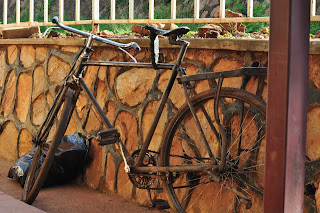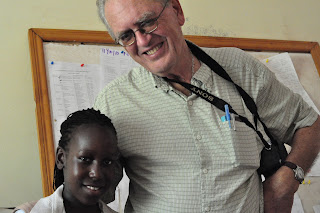It’s
perfect. Especially since the November 11 passing of an amazing
person to whom I met, got to know, became friends with and admired. For his
strength in fighting Cancer and for his conviction in helping to raise funds to
research the cure.
I wrote
down on a piece of paper all the people I’ve known amongst my family, friends
and associates that have Cancer or have died from Cancer. There are eight.
Today’s
it’s World Aids Day. Do you know anyone who has died of AIDS or who is HIV
positive?
Personally, close to me – I don’t know anyone.
Personally, close to me – I don’t know anyone.
However,
this time last year when I was in Uganda helping out at Mengo Hospital's AIDS Clinic, there were many. It was astonishing.
I spent
time documenting their stories of hope. (Search Uganda Wishes for more).
The disease
has stages. Ravaging the young and old in different ways.
Nutrition
roots the progress. Especially in children.
 |
| HIV Positive Children (mostly orphans) at the AIDS Clinic. |
It was a
mother with two children that impacted me the most.
She
discovered after her first child was born that she was HIV positive. Because of
her child’s ill health. The child was tested which led to her discovery.
She got
onto the appropriate drugs (which take their toll in side affects) and her
second child was born.
HIV free.
There is so
much hope. The drugs help many.
Mengo Hospital Canada’s fundraising efforts continue for a food supplement for the
children and adults. Epap (manufactured in South Africa) contains many of the
essential vitamins and minerals missing in the otherwise starchy Ugandan diet.
You see,
once a child or adult begins taking drugs for the treatment of HIV. They are on
them for life.
But if
their CD4 count (a measurement stick so to speak of the ravages of the disease)
stays at a level where the drugs aren’t required. The easier it is for them to
live with the disease.
Dr.
Sparling whom I volunteered with at the clinic studied the nutritional benefits
of treating HIV positive patients, not yet on the Antiretroviral drugs. The results
were positive.
I also helped
count pills in the pharmacy while at the AIDS Clinic. The longer an HIV patient
can go without having to take piles if pills, the better their life will be.
If extra
nutritional supplements can help, here’s a way we can help support those living
with the disease.
Consider
making a donation to Mengo Hospital Canada in support of ePap.










